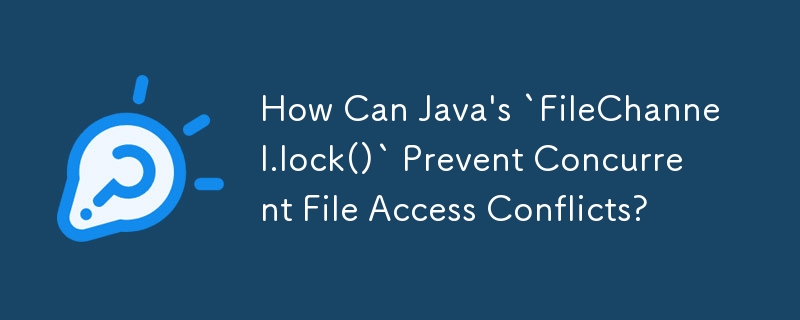 Java
Java
 javaTutorial
javaTutorial
 How Can Java's `FileChannel.lock()` Prevent Concurrent File Access Conflicts?
How Can Java's `FileChannel.lock()` Prevent Concurrent File Access Conflicts?
How Can Java's `FileChannel.lock()` Prevent Concurrent File Access Conflicts?

Locking Files for Exclusive Access in Java Using FileChannel.lock()
If you encounter a scenario where multiple Java processes require concurrent access to a file, it becomes essential to prevent simultaneous modification or accessing of the file. Fortunately, the Java platform provides a mechanism to achieve this through the use of FileChannel.lock().
Implementing the Lock
To lock a file for exclusive access, you can leverage the following code snippet:
try (
FileInputStream in = new FileInputStream(file);
java.nio.channels.FileLock lock = in.getChannel().lock();
Reader reader = new InputStreamReader(in, charset)
) {
// Perform operations on the file
}The FileInputStream object establishes a connection to the file, and the subsequent call to getChannel() returns a channel associated with the file. The FileChannel provides methods to manipulate the file, including lock(), which acquires an exclusive lock on the file.
Implications for File Access
Once a file is locked using FileChannel.lock(), any attempt by another process to acquire a lock on the same file will result in an exception. Here's how it affects concurrent file access:
- Read Process (ReadApp): If ReadApp has locked the file for reading, WriteApp will encounter an exception when trying to lock the file for writing.
- Write Process (WriteApp): If WriteApp has locked the file for writing, ReadApp will fail to lock the file for reading, preventing potential conflicts during file operations.
Platform Considerations
Note that the behavior of FileChannel.lock() may vary across operating systems due to platform dependencies. Refer to the official API documentation for specific information regarding your target platform.
The above is the detailed content of How Can Java's `FileChannel.lock()` Prevent Concurrent File Access Conflicts?. For more information, please follow other related articles on the PHP Chinese website!

Hot AI Tools

Undresser.AI Undress
AI-powered app for creating realistic nude photos

AI Clothes Remover
Online AI tool for removing clothes from photos.

Undress AI Tool
Undress images for free

Clothoff.io
AI clothes remover

AI Hentai Generator
Generate AI Hentai for free.

Hot Article

Hot Tools

Notepad++7.3.1
Easy-to-use and free code editor

SublimeText3 Chinese version
Chinese version, very easy to use

Zend Studio 13.0.1
Powerful PHP integrated development environment

Dreamweaver CS6
Visual web development tools

SublimeText3 Mac version
God-level code editing software (SublimeText3)

Hot Topics
 1381
1381
 52
52
 How does Java's classloading mechanism work, including different classloaders and their delegation models?
Mar 17, 2025 pm 05:35 PM
How does Java's classloading mechanism work, including different classloaders and their delegation models?
Mar 17, 2025 pm 05:35 PM
Java's classloading involves loading, linking, and initializing classes using a hierarchical system with Bootstrap, Extension, and Application classloaders. The parent delegation model ensures core classes are loaded first, affecting custom class loa
 How do I implement multi-level caching in Java applications using libraries like Caffeine or Guava Cache?
Mar 17, 2025 pm 05:44 PM
How do I implement multi-level caching in Java applications using libraries like Caffeine or Guava Cache?
Mar 17, 2025 pm 05:44 PM
The article discusses implementing multi-level caching in Java using Caffeine and Guava Cache to enhance application performance. It covers setup, integration, and performance benefits, along with configuration and eviction policy management best pra
 How can I use JPA (Java Persistence API) for object-relational mapping with advanced features like caching and lazy loading?
Mar 17, 2025 pm 05:43 PM
How can I use JPA (Java Persistence API) for object-relational mapping with advanced features like caching and lazy loading?
Mar 17, 2025 pm 05:43 PM
The article discusses using JPA for object-relational mapping with advanced features like caching and lazy loading. It covers setup, entity mapping, and best practices for optimizing performance while highlighting potential pitfalls.[159 characters]
 How do I use Maven or Gradle for advanced Java project management, build automation, and dependency resolution?
Mar 17, 2025 pm 05:46 PM
How do I use Maven or Gradle for advanced Java project management, build automation, and dependency resolution?
Mar 17, 2025 pm 05:46 PM
The article discusses using Maven and Gradle for Java project management, build automation, and dependency resolution, comparing their approaches and optimization strategies.
 How do I create and use custom Java libraries (JAR files) with proper versioning and dependency management?
Mar 17, 2025 pm 05:45 PM
How do I create and use custom Java libraries (JAR files) with proper versioning and dependency management?
Mar 17, 2025 pm 05:45 PM
The article discusses creating and using custom Java libraries (JAR files) with proper versioning and dependency management, using tools like Maven and Gradle.



